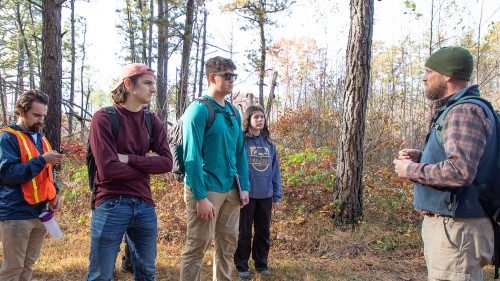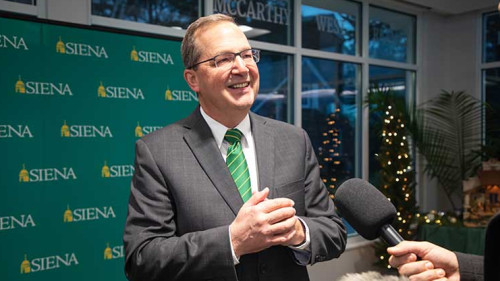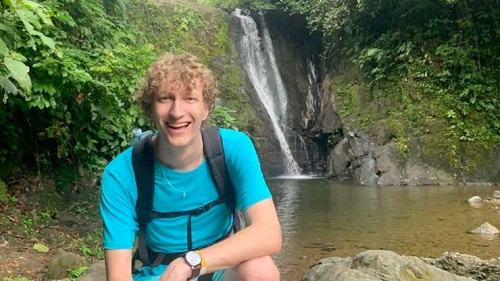
A Siena professor and her colleagues will work with teams of faculty at other colleges to create collaborative, multi-institutional ecological research projects, thanks to a $499,750 grant from the National Science Foundation (NSF).
Mary Beth Kolozsvary, associate professor of environmental studies and sciences, is a co-principal investigator of the five-year grant for the “Macrosystems Ecology For All (MEFA) Research Coordination Network.” It will be administered through Ohio Wesleyan University.
The grant will support faculty as they create projects that focus on linking macrosystems ecology concepts, large environmental datasets, and DEIJ (diversity, equity, inclusion, and justice) principles.
“Our Environmental Studies and Sciences students are passionate about tackling pressing environmental concerns and social justice issues,” said Kolozsvary. “This grant will provide our undergraduates with the opportunity to engage fully in developing the focus of far-reaching research questions, gathering data, and developing solutions. It will provide very powerful learning experiences, and I am excited to navigate this journey.”
The planning phase has just begun; Kolozsvary said the MEFA projects will be designed to involve students in various aspects of the research such as data collection or analysis, so they can learn about macrosystems ecology through hands-on authentic research experiences.
The MEFA Research Coordination Network RCN made up of teams at nine participating colleges and universities will build a diverse and welcoming community for faculty from teaching-oriented positions to gain the training necessary to become full participants in macrosystems science.
“This training will use existing environmental datasets, and serve as vehicles for teaching students macrosystems concepts, which explores connections across different scales, and data science techniques through authentic research experiences,” she said.
Virtual training events will be offered with partners including the BEDE (Biological and Environmental Data Education) Network, Project EDDIE (Environmental Data-Driven Inquiry and Exploration), and NEON (National Ecological Observatory Network) to improve data science skills and familiarity with existing data resources. An annual in-person meeting will provide opportunities to work on research project and curriculum development, and will allow for interactions with macrosystems scientists.
Kolozsvary added that a survey of NSF award titles for similar projects showed that only eight out of 184 awards were given to primarily undergraduate institutions.
“This suggests that there is a large pool of talented ecology faculty who could engage with macrosystems science and NEON datasets but are not doing so,” she said. “The coordination network will provide a gateway for these faculty to learn more about macrosystems concepts, update their data science skills, and design projects that resonate with their scientific interests and foster active, hands-on research programs with undergraduates.”
Collaboration across institutions will be emphasized to build camaraderie, share workload, and address large-scale ecological questions with efficiency. Having more researchers from diverse personal and institutional backgrounds engaging with macrosystems ecology will bring fresh perspectives and innovation to this important scientific field and increase the number of users engaging with NEON and other open access environmental datasets.
“Through the faculty training provided by MEFA, more undergrads will be exposed to emerging data science and macrosystems concepts,” she said “MEFA will engage faculty from a range of institution types, including community colleges and minority-serving institutions, allowing for diverse student populations to benefit from faculty training.”
Training resources developed by MEFA will be freely available online and virtual events will be recorded and archived for future viewing.

